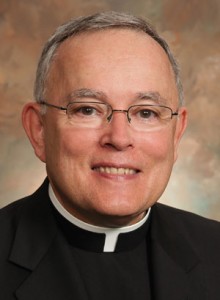“The vocation of being a ‘protector,’ however, is not just something involving us Christians alone; it also has a prior dimension which is simply human, involving everyone.”
— Pope Francis, inaugural Mass homily
In two short weeks, the former archbishop of Buenos Aires, now bishop of Rome and pastor of the universal Church, has won millions of hearts with his humility. But much like Blessed John XXIII, a great deal of substance seems to burn behind his simplicity, his easy manner and his dramatic public gestures. In these early days of the Easter season, we’d do well to read and pray over his March 19 inaugural Mass homily.
Francis’ homily, delivered on the Solemnity of St. Joseph, focuses movingly on Joseph’s role as protector of Jesus, Mary and the Church. But the real power of his words comes from the cumulative effect of his sincerity and the unadorned clarity of his message. Nothing in his homily rings false. It’s a simple, compelling expression of the Church’s vocation to be a witness of Christ’s love in the world, spoken by a man who convincingly embodies the message. A central task of the Church, for Francis, is to serve and protect the weak, and to lead others – including the world outside the Church — to do the same by her example. In his words:
“The vocation of being a ‘protector,’ however, is not just something involving us Christians alone; it also has a prior dimension which is simply human, involving everyone. It means protecting all creation, the beauty of the created world, as the Book of Genesis tells us and as Saint Francis of Assisi showed us. It means respecting each of God’s creatures and respecting the environment in which we live. It means protecting people, showing loving concern for each and every person, especially children, the elderly, those in need, who are often the last we think about. It means caring for one another in our families . . . It means building sincere friendships in which we protect one another in trust, respect, and goodness. In the end, everything has been entrusted to our protection, and all of us are responsible for it.”
Thus, one of the basic marks of a true shepherd must be to love and protect the people entrusted to him, Care for other people’s dignity is the duty of every person in authority: every public official, every teacher and every parent. But bishops, pastors and all Christians have the added obligation to see the human person through the lens of eternity, with God’s eyes and God’s love. Each human person is precious and unrepeatable; intended by God from before time; made for eternal joy; and fashioned in the image and likeness of the Creator.
In many ways over many years, the Church in Philadelphia has protected the weak and served human dignity with exceptional skill – feeding the hungry, sheltering the homeless, comforting the sick and elderly, helping the immigrant. That service continues today, even in the face of our financial challenges, along with a great legacy of educating our young people in a system of outstanding schools. No similar organization comes close to matching the service provided to the general public by the Catholic community in our region.
Yet it’s also true that our witness has been bitterly undermined by cases of sexual abuse of children in the past. These sins, these failures to protect innocent young people, have no excuse; they’ve resulted in terribly wounded lives — survivors to whom we owe continuing help for their healing. I can and do apologize for this hurt on my own behalf and on behalf of the Church, with all my heart. But the obligation remains to prevent this kind of damage in the future.
No system is perfect. People determined to do evil sometimes find ways to circumvent the best safeguards. But over the past two years the Church in Philadelphia has done everything in her power to develop policies and procedures to protect the innocence of our young people, and to train our faithful in recognizing and reporting the signs of sexual abuse.
We’ve expanded and upgraded our Archdiocesan Review Board. We’ve rewritten our standards of ministerial behavior and sexual misconduct policies with the counsel of district attorneys. We’ve trained more than 30,000 adults in recognizing and reporting sexual abuse. In FY 2012 alone, we provided age-appropriate personal safety instructions, including internet safety guidance, to more than 100,000 children. Additionally, we trained 7,000 adults regarding their role as Mandated Reporters under Pennsylvania law. None of this redeems the past. But it does help ensure a better and safer future.
April is Child Abuse Prevention month. It’s a painful but also a graced moment. We need to pause and remember the survivors of abuse in our actions and in our prayers – no matter where, or at the hands of whom and what institution, the abuse occurred. As the words of Pope Francis remind us, it’s vital to the vocation of the Church to protect the people in her care and to lead others to do the same by her witness. In the coming years, we need to keep that fact close to our hearts, and live accordingly.
PREVIOUS: Holy Week and the path to Easter, 2013
NEXT: The nature of marriage and the source of human thriving




Share this story